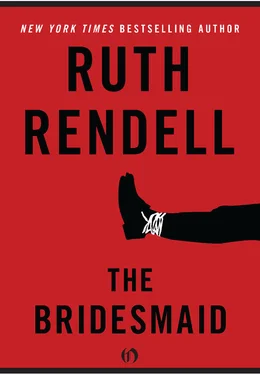Ruth Rendell - The Bridesmaid
Здесь есть возможность читать онлайн «Ruth Rendell - The Bridesmaid» весь текст электронной книги совершенно бесплатно (целиком полную версию без сокращений). В некоторых случаях можно слушать аудио, скачать через торрент в формате fb2 и присутствует краткое содержание. Год выпуска: 2010, Издательство: Open Road Integrated Media LLC, Жанр: Триллер, на английском языке. Описание произведения, (предисловие) а так же отзывы посетителей доступны на портале библиотеки ЛибКат.
- Название:The Bridesmaid
- Автор:
- Издательство:Open Road Integrated Media LLC
- Жанр:
- Год:2010
- ISBN:нет данных
- Рейтинг книги:3 / 5. Голосов: 1
-
Избранное:Добавить в избранное
- Отзывы:
-
Ваша оценка:
- 60
- 1
- 2
- 3
- 4
- 5
The Bridesmaid: краткое содержание, описание и аннотация
Предлагаем к чтению аннотацию, описание, краткое содержание или предисловие (зависит от того, что написал сам автор книги «The Bridesmaid»). Если вы не нашли необходимую информацию о книге — напишите в комментариях, мы постараемся отыскать её.
The Bridesmaid — читать онлайн бесплатно полную книгу (весь текст) целиком
Ниже представлен текст книги, разбитый по страницам. Система сохранения места последней прочитанной страницы, позволяет с удобством читать онлайн бесплатно книгу «The Bridesmaid», без необходимости каждый раз заново искать на чём Вы остановились. Поставьте закладку, и сможете в любой момент перейти на страницу, на которой закончили чтение.
Интервал:
Закладка:
He stood in the rain staring up at the house. There was nothing else to do. He had begun to notice all kinds of things about it that at first he had missed. There was a Greenpeace sticker in the left corner of the top left-hand window. On the painted framework of the middle-floor shutters something had been written in pencil beside a little pencil drawing. He was too far away to see what was written or drawn. Inside the middle window on the top floor a green glass wine bottle stood on the sill, a little way right of centre. The rain continued to fall steadily from a sky which was precisely the same shade as the grey slates on the roof. He noticed that from the pitched roof of the porch one tile was missing.
He went up the stairs and banged on the front door, avoiding the coiled pile of dog turd on the second step. After a while he looked through the letterbox. This time he saw the phone and the passage leading away to the basement stairs and something new. Two envelopes lay on the table beside the phone.
At home he changed out of his suit and hung it up to dry, dried his hair on a towel, remembering how, that first day, she had asked for a towel to dry her own. He cooked egg and bacon but, when it was served up on a plate with a hunk of bread and butter, couldn’t eat it. The phone rang and his heart hit his ribs. No voice would come when he lifted the receiver, he was sure of that. It was a kind of croak he gave.
“Are you OK?” Fee said. “You sound peculiar.”
“I’m fine.”
“I rang to know if you wanted me to get anything in for Mum on Wednesday. You know, a loaf and some ham or something.”
The question he longed to ask, was dying to ask, was displaced by another, seemingly less significant. “Was it RADA Senta was at? Was it the Royal Academy of Dramatic Art?”
“What?”
He repeated the question. He was starting to feel sick. “I wouldn’t know,” she said. “How should I know?”
“Would you ask Darren, please?”
“Why do you want to know?”
“Just ask him, please, Fee.”
He heard his question relayed to Darren in a tone stiff with sarcasm. They seemed to be arguing. Had it taken marriage to show Fee her childhood sweetheart was somewhat slow on the uptake? She came back to the phone.
“He says he went there once with his brother to see something she was in. It wasn’t like a building, you know what I mean, it was just a big house. Out west somewhere, Ealing, Acton.”
“RADA is near the British Museum, it’s in Bloomsbury. Is he sure it wasn’t there?”
“He says Ealing definitely. What is all this, Phil? What’s going on? You’re always asking questions about Senta.”
“I’m sure I’m not.”
“Darren says, ‘Do you want her phone number?’”
The irony! He knew that phone number better than his own, better than his own birth date, his address. He said, “No to that and yes to the first question. If you could get a loaf in and something for their supper, Fee.”
She was laughing as she said good-bye.
He sat there, pondering. It was new to him, this revelation that someone could both tell the truth and fantasise, for that was what it amounted to. She had told him true things and she had embroidered the truth. Where the truth was adequate, she had offered it to him, and where it fell short of glamour or drama, she had invented. Did he do that? Do we all? And where in this scheme of things did her request that he prove his love for her find its place? Was it a fantasy or a real demand for a real act?
Presently he dialled her number. This time the answering machine wasn’t on and the phone rang and rang unanswered.
It was late at night. The sky was dull and without visible stars, moonless, faintly misty, a smoky red where a horizon of roofs could be seen. Dampness was palpable in the cool, still air. On the corner where Tarsus Street met Caesarea Road stood three men about Philip’s own age, one of them a Rastafarian, the others white, nondescript, one wearing several rings in the lobe of his right ear. Philip noticed the rings because they glinted in his car lights. The men turned to stare at him, watched the car, watched him get out of it. They did nothing.
The old bag man was nowhere to be seen. Philip hadn’t seen him since the weather changed. The street was still littered with rags of paper, cardboard boxes, cuboid juice cartons with straws still sticking out of them. A greenish lamplight glazed the moist sticky pavements, the railings, the gleaming humpbacks of parked cars. A dog came along the pitted concrete from Samaria Street, busy in pursuit of some unknown goal, perhaps the same dog which had deposited the heap of turds on the step. It disappeared down into the area next door. An occasional drop of water trickled and fell from the leaves on the plane trees.
Philip, momentarily, had a strange feeling that came quite unbidden. It was as if a voice within him asked him what he was doing seeking love, passion, perhaps a life’s partner, in this awful place. For what woman who had any choice about it, and alternative, would choose to live in this filthy sink of northwest London, this rancid hole? This unwelcome reflection fled as fast as it had come, for looking up wearily by now at the house, he saw the shutters had been closed at the middle window on the ground floor and between their boards, where the wood had warped, light showed in bright lines.
He ran up the steps. The front door was open. That is, it was unlocked, on the latch. He could hardly believe it. From somewhere inside came the sound of music in waltz time, the same kind of music as he had sometimes heard late at night lying in bed beside Senta. The “Blue Danube.” As he stood there, it stopped and he heard laughter and hands clapping. He pushed the door open and went in. The music, which was coming from inside the room on the left where the light showed through the shutters, began again, this time a tango, “Jealousy.” On all his visits to this house he had scarcely noticed that there were doors opening off this hallway, had never conjectured that there must be rooms behind. He had thought of nothing but going to Senta. This room, of course, would be directly above hers.
He must have made a sound, though he was unaware of it. Perhaps he had drawn in his breath sharply or his footsteps had made a floorboard creak, for the door was suddenly flung open and a man shouted, “What the fuck do you think you’re doing?”
Philip was silenced and in fact stricken statuelike as much by the sight of the two people who stood just inside the room as by the man’s violent and abusive tone. The pair of them were in evening dress. They reminded him of Fred Astaire and Ginger Rogers in one of those thirties films you sometimes saw on television, and then he saw that they were not really like that at all. The woman was in her fifties, with a mane of long grey hair and a coarse, lined, though lively face and a sleek sinuous figure to which her shabby red silk dress clung. A bunch of bruised artificial flowers on the bodice, red and pink, trembled as she drew breath. Her partner was smart enough, though unshaven and with ragged hair. His face was white and thin, his hair yellow, and he was no more than four or five years older than Philip himself.
Finding a voice, Philip said, “I’m sorry. I was looking for Senta—Senta Pelham, she lives downstairs. The front door was open.”
“Christ, she must have left it open again,” the woman said. “She’s always doing that, it’s bloody careless.”
Her partner went over to the tape player and turned the sound down. “She’s gone to a party,” he said. “Who are you anyway?”
“Philip Wardman. I’m a friend of hers.”
For some reason the woman laughed. “You’re the one who left the message on our answer-phone.”
Читать дальшеИнтервал:
Закладка:
Похожие книги на «The Bridesmaid»
Представляем Вашему вниманию похожие книги на «The Bridesmaid» списком для выбора. Мы отобрали схожую по названию и смыслу литературу в надежде предоставить читателям больше вариантов отыскать новые, интересные, ещё непрочитанные произведения.
Обсуждение, отзывы о книге «The Bridesmaid» и просто собственные мнения читателей. Оставьте ваши комментарии, напишите, что Вы думаете о произведении, его смысле или главных героях. Укажите что конкретно понравилось, а что нет, и почему Вы так считаете.











